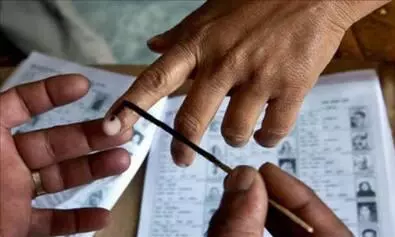
Lok Sabha Elections to commence on April 19, Kerala polls scheduled for April 26
text_fieldsThe Election Commission of India unveiled the schedule and phases for the upcoming Lok Sabha elections, initiating a significant democratic process nationwide, spanning April and May, which will also include Assembly elections in Arunachal Pradesh, Andhra Pradesh, Odisha, Sikkim, and the Union Territory of Jammu and Kashmir.
Chief Election Commissioner Rajiv Kumar, alongside newly appointed Election Commissioners Gyanesh Kumar and SS Sandhu, revealed that the electoral process will unfold in seven phases, following a similar pattern to previous Lok Sabha elections.
Tamil Nadu is set to cast its votes in the initial phase on April 19, 2024, with the deadline for nominations concluding on March 27, 2024. Following closely, Kerala will undergo polling in the second phase on April 26, 2024, with nominations closing on April 4, 2024.
Karnataka's electoral process will be split, with a portion of the state voting on April 26, 2024, and the remainder participating in the third phase on May 7, 2024, with the nomination window shutting on April 4 and April 19, respectively.
Andhra Pradesh and Telangana are slated for polling in the fourth phase on May 13, 2024, with the nominations ending on April 25, 2024. These dates mark crucial milestones as the nation gears up for the democratic exercise, shaping the course of governance and representation in the coming years.
The announcement comes against the backdrop of recent developments, including the notification of the Citizenship Amendment Rules and the partial disclosure of information regarding the purchase of Electoral Bonds on the ECI website. This release follows the Supreme Court's decision not to grant an extension to the State Bank of India (SBI) to disclose the details of electoral bonds to the public, with the information expected to be made public on March 15.
With 96.8 crore registered voters, including 1.82 crore first-time voters, and over 10.5 lakh polling stations equipped with 55 lakh EVMs, the scale of the upcoming elections underscores the magnitude of India's democratic process.
The political landscape is marked by shifting alliances and strategic manoeuvres. The Congress party, part of the Indian National Developmental Inclusive Alliance (INDIA) platform comprising around 25 political parties, aims to challenge the ruling Bharatiya Janata Party (BJP). However, recent defections and disagreements over seat-sharing have impacted the unity of the coalition.
In states like Karnataka, Tamil Nadu, and Andhra Pradesh, intricate political dynamics have emerged, with alliances forming and dissolving in the run-up to the elections. The BJP, JD(S), and Congress are set for a competitive battle in Karnataka, while the BJP faces challenges in Tamil Nadu amidst internal discord within its alliance.
Furthermore, regional players like the Telugu Desam Party (TDP) and Jana Sena in Andhra Pradesh, as well as the Left Democratic Front (LDF) and United Democratic Front (UDF) in Kerala, are gearing up for intense electoral contests.
As the nation braces for this electoral spectacle, all eyes are on the Election Commission to ensure the conduct of free and fair elections, safeguarding the principles of democracy and upholding the voice of the electorate.
The elections will kick off with the Assembly polls in Sikkim and Arunachal Pradesh on April 19, followed by voting in Andhra Pradesh on May 13. The Lok Sabha polls will be conducted across seven phases, starting on April 19 and concluding on June 4, with the results scheduled for announcement on the same day.
Expressing concerns over the declining political discourse, Chief Election Commissioner Rajiv Kumar emphasized the Election Commission's commitment to fostering a more civil and issue-based campaigning environment. Measures such as discouraging hate speeches, religious appeals, and unverified advertisements underscore the EC's determination to uphold the integrity of the electoral process.
Addressing challenges ranging from financial inducements to misinformation campaigns, the Election Commission assured the public of its readiness to ensure fair and violence-free elections. With a record 97 crore registered voters, the upcoming polls represent a significant moment in Indian democracy.
Furthermore, the Election Commission announced its preparedness to facilitate vote-from-home options for elderly citizens above 85 and persons with disabilities across the country, emphasizing inclusivity in the electoral process.
As India braces for this monumental democratic exercise, Chief Election Commissioner Rajiv Kumar reiterated the EC's commitment to delivering elections that would enhance India's standing on the global stage. With the stage set for what promises to be a historic electoral battle, all eyes are now on the forthcoming Lok Sabha polls, poised to shape the future trajectory of the world's largest democracy.























